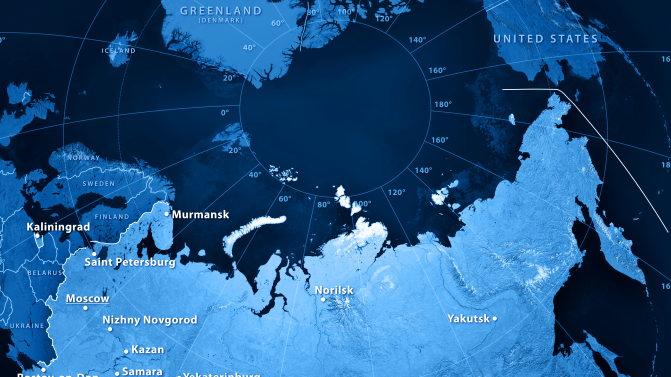Russia’s new Navy icebreaker steers clear of Arctic waters

The 85 meter long, 6000 ton heavy vessel in late January started its voyage towards Kamchatka where it is to be based as part of Russia’s Pacific Fleet. The Yevpatii Kolovrat is the Russian Navy’s second icebreaker of the 21180 project, built to assist warships through rough icy waters.
But although it is designed for manoeuvring in thick ice, the vessel that is named after a 13th Century war hero did not sail the shortcut through the Northern Sea Route, but instead chose the southern route through the Suez Canal.
On the 11th of May, the ship sailed through the Indian Ocean off the coast of Sri Lanka, and as soon as it arrives in Petropavlovsk in Kamchatka it will be formally included in the Pacific Fleet, the Russian Navy informs.
It is not only the Yevpatii Kolovrat that has shun the Northern Sea Route during the winter of 2023. Since October 2022 no vessel have sailed transit across the remote Arctic waters.
The only exceptions are a few LNG carriers that have sailed from Sabetta in Yamal Peninsula to ports in China. However, even these powerful icebreaking tankers have needed assistance from nuclear icebreakers. The Boris Vilkitsky in January crossed the route from Tianjin, China, to Sabetta and was escorted by icebreaker Arktika through the Laptev Sea and into the Kara Sea.
Sea-ice cover in May
Data from the Russian Arctic and Antarctic Research Institute show that a thick layer of sea-ice covered Russian Arctic waters in early May. In the Laptev Sea and the East Siberian Sea two belts of multi-year ice make shipping extraordinary complicated.
The Yevpatii Kolovrat will significantly boost Russian naval capacities in far northern waters. It is capable of breaking through up to 1,5 meter thick ice and will in addition to escorts of warships be used for patrols along the Russian Arctic coast and supply of remote Arctic naval bases.
From before, the Russian Navy has sister ship Ilya Muromets in the Northern Fleet. The icebreaker was officially included in the naval forces in 2017.
Ships of the 21180 project are built with Russian technology, then Navy Commander-in-Chief Admiral Korolyov said in 2017.
“Use of the newest Russian technologies in the construction of ice-class ships for the Navy allows one to make the conclusion that domestic military shipbuilding has been able to preserve and develop its potential in this field,” he said in a comment.
In addition to the Project 21180 and 21180М, the Russian Navy is building two icebreaking patrol vessels of the 23550 class. The Ivan Papanin and Nikolay Zubov are planned to be commissioned in 2023 and 2024. Also the FSB is building a similar vessel – the Purga – for its northern coast guard units, due to be ready for sailing in 2024.
Related stories from around the North:
Canada: Canadian icebreaker project estimated at $7.25 billion, Eye on the Arctic
Denmark/Greenland: New guideline launched for Arctic-specific risk assessment in shipping, Eye on the Arctic
Finland: Finland’s aging icebreaker fleet needs modernization, Yle News
Iceland: Int’l Arctic emergency marine exercise will lead to better response coordination, say participants, Eye on the Arctic
Norway: The Viking Sky incident – A wake-up call for the Arctic cruise industry?, Eye on the Arctic
Russia: Finnish shipbuilders contract powerful icebreaker for Russian Arctic, The Independent Barents Observer
United States: ‘Uber for icebreakers’ idea gains traction in U.S. Senate, Alaska Public Media



